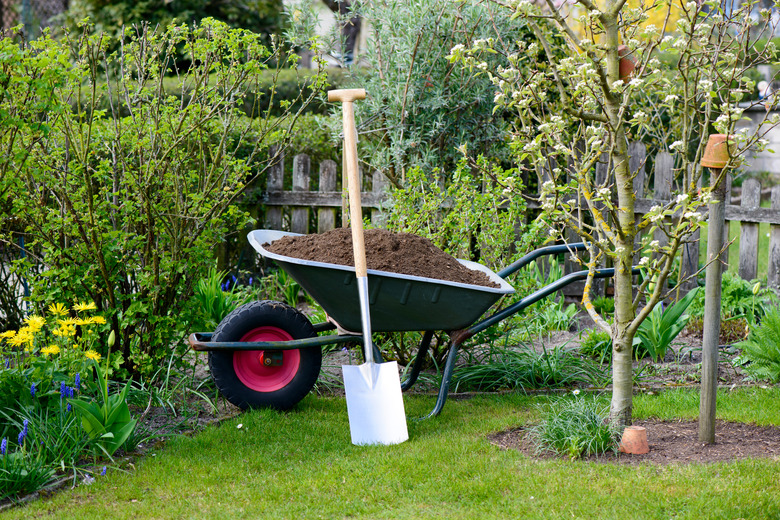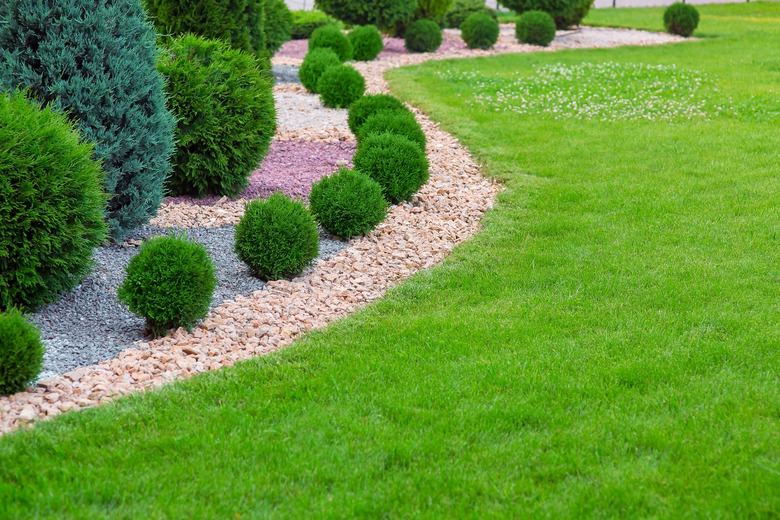How (And When) To Hire A Gardener
We may receive a commission on purchases made from links.
You're really looking forward to inviting guests to enjoy your new home's backyard, except for one minor detail — the landscaping needs a major overhaul. Overgrown shrubs, patchy grass, and a lack of curb (and patio) appeal mean it's time to consider hiring a gardener. After all, it could take months to do the work yourself, while a gardener can have it finished in a much shorter time frame. Before calling around, write down your full expectations for landscaping services so that you and your new professional gardener have the same vision in mind for all of your home's outdoor spaces.
What a Gardener Does
What a Gardener Does
A gardener handles a vast array of tasks regarding outdoor plants and the yard in general, but what any specific gardener does depends on their specialties. No matter what, a gardener should know which plants thrive in your area. They can tell when a plant or your lawn isn't as healthy as it could be, and they know how to treat the issue at hand. Gardeners also maintain lawns to ensure the grass stays healthy. This goes beyond basic weekly mowing services and often includes regular weeding, overseeding, or applying fertilizers as needed.
A gardener may also come up with a design and plan for what to plant in your flower beds after you describe your vision for the spaces. They do everything from providing and planting flowers and shrubs to maintaining them and your existing yard plants as well as mulching and weeding the flower beds.
Like artists, the experience, skills, and specialties vary from one gardener to the next, so it's best to research several highly rated gardeners in your area before choosing one. While a gardener tends to the natural elements of the landscape and plants in particular, they generally don't deal with yard-related construction projects, such as building or fixing a fence. A landscaper often handles such minor constructions, but again, this varies from person to person or company to company.
Doing Your Homework
Doing Your Homework
Before hunting for the perfect gardener, consider what types of landscaping services you really need and how often you'll need them. For instance, if you want a new flower bed in front of the porch but have no clue which flowers to choose or how to make the space look nice, you'll want the gardener to design the space for you and then plant it. You may want them to maintain that space from time to time, or you may be able to handle the weeding yourself; this would mean the difference between a short-term project and ongoing gardening services. Be sure you know what you want up front so the gardener can come up with the best landscaping solution for your needs and price the services accordingly.
If you have ornamental trees or artistically shaped hedges and a yard so large you don't have time to mow it every week, you'll want a gardener to shape and otherwise maintain all the plants as well as mow the lawn. This requires ongoing regular service, such as weekly mowing and biweekly or monthly hedge maintenance.
Be certain about your expectations and your vision for any landscaping projects, as the more you can tell the gardener up front before hiring them, the better. If you want a few dwarf ornamental trees planted in the yard and then maintained until they're thriving on their own, be as specific as possible with the gardener. The more clear your expectations, the better the chance you'll be happy with their work as it takes shape according to your vision for the yard.
Why Hire a Gardener?
Why Hire a Gardener?
Hire a gardener when the vision you have to overhaul your yard takes more work than you're willing to do on your own. If you want gorgeous flower beds that display some color in spring, summer, and autumn, hire a gardener, as they'll know what to plant for successive blooms throughout the entire growing season.
If you only need the lawn mowed on a regular basis and nothing beyond basic yard maintenance, a lawn mowing service may be a better bargain. It still doesn't hurt to ask a gardener what they'd charge for ongoing lawn maintenance and then compare that to what a local landscaper or mowing company charges. The benefit of working with a gardener specifically for mowing is that you'll already be familiar with the gardener should you need to hire her for other landscape-related tasks. They may even give you a deal or a bundling price for any extra work.
If you have a number of trees that seem diseased or infested with insects, find a gardener with arborist certification or at least several years of experience dealing with tree health issues. Otherwise, just hire an arborist for tree-related issues.
When to Hire a Gardener
When to Hire a Gardener
While you could hire a gardener at any time of year, it's a good idea to start early before the growing season begins and before landscaping season gets busy. February is a good month to start making calls even if you won't actually require any landscaping services for another month or two. At this point, the gardener may still have some openings in his schedule for large projects or for scheduled weekly or biweekly yard and garden maintenance.
If it's the middle of summer before you realize your yard needs professional help, it may be a little more difficult to find a gardener who is available immediately to treat the grub problem plaguing your lawn, but the right gardener will fit you into his schedule. Fall is also an ideal time for some landscaping projects, such as lawn replanting and overseeding. In many cases, tree trimming is also best done in fall and winter when the tree is dormant, although this may vary based on your regional climate. In other words, any time of year can be the right time to hire a gardener depending on the project. An experienced gardener knows the best time of year to perform seasonal tasks in your local climate.
Questions to Ask a Gardener Before Hiring
Questions to Ask a Gardener Before Hiring
The questions to ask a potential gardener vary a bit depending on what you need for your yard. If you're hiring them to mow and maintain the lawn, ask how often and what time they'll show up as well as if they occasionally edge the lawn, weed it, or inspect the grass for issues, such as thatch or bare spots. Ask whether they use purely organic lawn care, as chemical pesticides and other lawn treatments may be harmful to the environment, pets, or people.
Find out whether they have handled the type of project you have in mind, such as creating a bonsai gardenscape or maintaining fruit trees to maximize fruit production and minimize pests. For plants in and around a pond, it's helpful to have a gardener who knows which plants are best for your pond setup.
Ask any potential gardener for references and where you can see their work. A busy gardener most likely has several clients a short distance from your home, so it shouldn't be difficult to arrange a visit to a nearby site to see their work. Also find out how long specific projects take in general, especially for designing and adding new flower beds or digging a small pond.
Find out if the potential gardener has liability insurance. If the gardener in mind is a company with a crew rather than a single individual, find out if the company carries workers' compensation to protect the workers on the job.
The Cost of Hiring a Gardener
The Cost of Hiring a Gardener
The cost of hiring a gardener varies greatly depending on the services required and how often they maintain your home's outdoor spaces. The size of the property is also a factor. Obviously, it takes a lot more time to maintain a huge yard with hedgerows and elaborate flower beds than a typical small or medium suburban yard. Gardeners often charge by the hour in a range of $50 to $100 per hour.
For basic services, such as lawn mowing or trimming hedges regularly, expect to pay $50 to $100 each time the gardener shows up assuming the yard is of average urban or suburban size. The larger the yard or the longer it takes to perform routine yard maintenance, the more expensive the fee. Scheduling basic yard care so the gardener shows up weekly or biweekly typically costs less per visit than having the gardener show up and perform the same tasks only once.
If the gardener visits for an hour or two every week or so for routine work, such as hand weeding and maintaining flower beds, expect to spend $200 to $400 per month for an average-size yard. Projects that require extra time and labor may cost extra, such as dethatching the lawn or replanting a large portion of it, so it's best to ask the gardener up front if there are extra costs for such projects as the need arises.
Gardener Licensing and Certification
Gardener Licensing and Certification
Licensing and certification requirements vary by state for landscape and garden professionals. Many states require no special certifications to do business as a gardener or landscaper. However, they do require applicator licensing for anyone applying certain types of chemical pesticides, as these types of chemicals are often hazardous if they are improperly used.
Some states issue specialty licenses in order for a gardener to perform specific landscape-related tasks. Louisiana, for instance, requires an arborist license and liability insurance for tree trimming or removal or a landscape horticulturalist license to maintain or plant shrubs or to even mulch around plants. Consult your local government website, as some locales may require specific licensing depending on the garden-related tasks at hand.
Master gardeners are not gardeners with a Master's degree; it just means they've completed a number of courses to give them extra certification, indicating they've learned about plant pathology and pests, for instance. In return for the education, master gardeners volunteer their time teaching children about plants and insects or helping groups of seniors at a senior center to start a raised-bed garden. They are volunteers and not necessarily gardeners professionally, although some may garden or landscape as a vocation.
References
- My Builder: Why February is the Perfect Time to Hire a Gardener
- Next Insurance: Landscaper Licensing Requirements by State: A Comprehensive Guide
- Reef Tropical Pool & Landscape: Professional Gardening Vs. Basic Landscape Maintenance – Why the Difference Matters to Your South Florida Property
- University of New Mexico: Gardener Job Description
- HomeAdvisor: How Much Does Lawn Care Cost?
- Jonathan Green: When to Overseed Lawn in Ohio
- Bonsai Tree Gardener: How to Landscape With Bonsai Trees
- The Ohio State University: Becoming a Master Gardener


